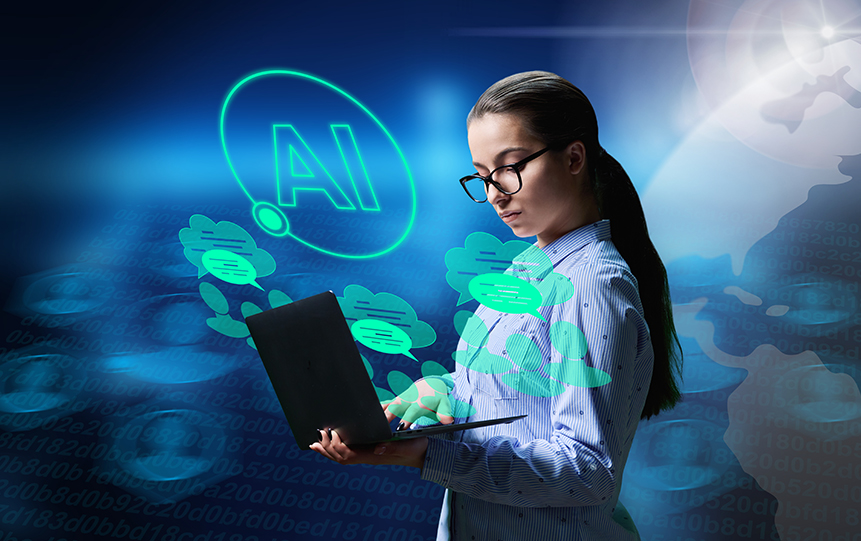It can almost feel like every conversation nowadays takes a turn towards artificial intelligence, mainly ChatGPT. There’s a look of fascination and fear on every face, with hushed tones slowly proclaiming a new paradigm in the world.
And nowhere is this truer than in the education sector, where ChatGPT and large language models are seen as an existential threat to the entire learning ecosystem. With AI’s impact already pervasive, are the claims of a collapse in academia well-founded? Let’s delve deeper into ChatGPT’s advantages and disadvantages to find out the answers.
What Are the Benefits of ChatGPT in Education?
ChatGPT offers numerous opportunities to enhance learning experiences. In the following, we’ve listed a few.
Personalized Learning
- Adaptive Learning Experiences: ChatGPT provides tailored educational content to students based on their learning pace and style. ChatGPT adapts explanations, examples, and exercises to suit individual needs, making learning more effective.
- 24/7 Availability: Unlike human tutors, ChatGPT is available around the clock, providing students with instant help whenever they need continuous availability which liberates learning from the confines of classroom hours.
Enhanced Engagement:
- Interactive Learning: ChatGPT engages students in interactive dialogues, making learning more dynamic and interesting. By simulating conversations, ChatGPT helps students better understand complex concepts through a more conversational and less formal approach. E.g., one can practice a new language with a tireless AI partner or explore scientific concepts through interactive simulations. Thus, ChatGPT creates engaging activities that solidify learning and make education more fun.
- Gamification: Integrating ChatGPT into educational games can make learning more enjoyable as the AI serves as a game master or a tutor within these educational games, providing hints, feedback, and explanations that enhance the learning experience.
Accessibility:
- Overcoming Language Barriers: ChatGPT breaks down language barriers by providing translations and explanations in multiple languages, making education more accessible to non-native speakers.
- Special Needs Support: AI can be programmed to cater to students with special needs, offering customized support that aligns with their unique learning requirements. For instance, text-to-speech functionality helps visually impaired students access information. For students with dyslexia, AI-powered dictation removes writing barriers.
- Enhanced Research and Critical Thinking: ChatGPT is a powerful research assistant, compiling information and generating diverse perspectives that empower students to delve deeper into topics, critically analyze information, and argue persuasively.
What Are the Drawbacks of ChatGPT in Education?
ChatGPT is a generative AI language model that understands and responds to queries with human-like text by employing machine learning algorithms to learn from massive volumes of data which generate answers in a conversational manner.
ChatGPT is widely used by students as a digital education technology for assignments, essays, research papers, and various forms of homework. However, ChatGPT in academic settings presents various problems:
- Plagiarism and Originality: Large language models give the superficial appearance of high-quality text, but because this information has been cobbled together from various external sources, one can’t claim the content is original or wholly free from plagiarism.
- Misinformation Risks: ChatGPT often provides incorrect or misleading data that relies solely on AI without human oversight, resulting in the dissemination of imprecise information.
- Lack of Depth: While ChatGPT can handle general queries, it often struggles with providing the deep, nuanced explanations required for advanced subjects or critical thinking development.
- Learning Outcomes: Academic assignments and homework are intended to increase student content retention, which can be negatively affected by using generative AI. When students rely on AI to complete assignments, they may not fully engage with the material or understand the underlying concepts. Instead of synthesizing information and developing their own ideas, they might simply accept AI-generated responses. This passive consumption of information can lead to shallow learning, where students remember facts in the short term but fail to retain or apply knowledge in the long term.
- Reduced Critical Thinking: Excessive dependence on ChatGPT can hinder the development of critical thinking and problem-solving skills as students become accustomed to receiving instant answers without engaging in the cognitive processes necessary for intensive learning.
- Data Privacy: Because the use of AI tools involves the collection and processing of student data, this raises concerns about privacy and data security. Hence, ensuring that student information is protected is crucial to preventing AI abuse.
- Bias and Fairness: AI models including ChatGPT can exhibit biases based on the data they were trained on, resulting in biased responses that may unfairly influence students’ perspectives.
- Digital Divide: Not all students have equal access to the necessary technology and internet connectivity required to use AI tools like ChatGPT, which can exacerbate existing educational inequalities.
- Resource Disparities: Schools in underfunded areas may struggle to implement and integrate AI tools effectively, leaving some students without the benefits these technologies offer.
And while ensuring consistency in student learning becomes the responsibility of educators, this can also be viewed as an opportunity for faculty to change their perspectives on digital learning solutions.
Hence, it’s important to recognize the potential of ChatGPT and similar tools as catalysts for positive change in education.
How Can Teachers Utilize AI Tools and Technologies?
As much as you’d like to try, you can’t stop the spreading prevalence of AI in education. Students are finding AI increasingly beneficial for personalized learning, creative writing prompts, for understanding technical subjects, and for finding answers to questions they might not ask in a classroom. Thus, faculty can utilize all this to their benefit by:
- Leveraging AI to generate course material, lesson plans, outlines, and even slideshow content.
- Developing formative and summative assessments for learning outcomes.
- Utilzing AI and automation for scheduling and better day planning.
- Formulating nuanced and insightful questions for daily teaching.
- Refining writing and finding more time to focus on crucial learning aspects such as:
- One-on-One Student Engagement: Spending more time on personalized interactions, mentoring, and addressing individual student needs.
- Deepening Subject Mastery: Developing and implementing innovative teaching methods that help students more thoroughly grasp complex concepts.
The Future of Education: Where ChatGPT Meets Immersive Learning
In conclusion, Generative AI, such as ChatGPT, holds significant promise for the future of education by transforming traditional learning methods into more immersive and interactive experiences. Of course, challenges remain. Misinformation, a lack of depth in responses, and potential biases within AI models require careful consideration. However, by leveraging AI’s capabilities, educators can create personalized and engaging content that meets the unique needs of each student. Thus, this innovative technology can facilitate continuous learning, enhance student engagement, and provide support for diverse learning requirements, thereby creating a more inclusive and effective educational environment.
In the eLearning industry, generative AI can also revolutionize how content is delivered and consumed. AI-driven platforms can simulate real-world scenarios, offer instant feedback, and adapt to individual learning paces, making education more dynamic and accessible. In addition, AI can be integrated into virtual classrooms to provide real-time assistance, foster collaborative learning, and ensure that learners receive immediate support and clarification.
MRCC EdTech, a global leader in AI-powered immersive and interactive learning content creation, can play a crucial role in this journey. With a comprehensive suite of services, MRCC EdTech helps institutions integrate AI into curricula, develop customized learning platforms, and provide ongoing support to ensure seamless implementation. For example:
- AI-Enhanced Curriculum Development: MRCC EdTech can assist in designing and implementing AI-driven curricula that adapt to student’s learning styles and paces, ensuring personalized and effective education.
- AI-Driven Content Creation: Imagine interactive simulations where students can dissect a virtual frog or explore the pyramids in 3D. MRCC EdTech can help develop immersive learning experiences, tailored to specific curriculum requirements.
- Personalized Learning Pathways: No two students learn the same way. Thus, MRCC EdTech can create AI-powered platforms that analyze student data and recommend personalized learning paths. We leverage AI to create interactive simulations, virtual labs, and gamified learning experiences with targeted exercises and quizzes that cater to individual strengths and weaknesses, making complex subjects more accessible and engaging.
- Automated Feedback and Assessment: Grading mountains of essays and tests can be time-consuming, so MRCC EdTech can integrate AI for the automated grading of basic mechanics, freeing up teachers to provide more meaningful feedback on critical thinking and analysis.
- Advanced Analytics: MRCC EdTech offers advanced data analytics services to track student progress, identify learning gaps, and provide actionable insights that improve educational outcomes.
By partnering with MRCC EdTech, educators can navigate the challenges of incorporating AI into their teaching strategies and thus fully realize the benefits of this powerful technology by creating a brighter and more engaging future for learners worldwide. Want to know more about us? Please contact us today!




Leave A Reply
Your email address will not be published. Required fields are marked *